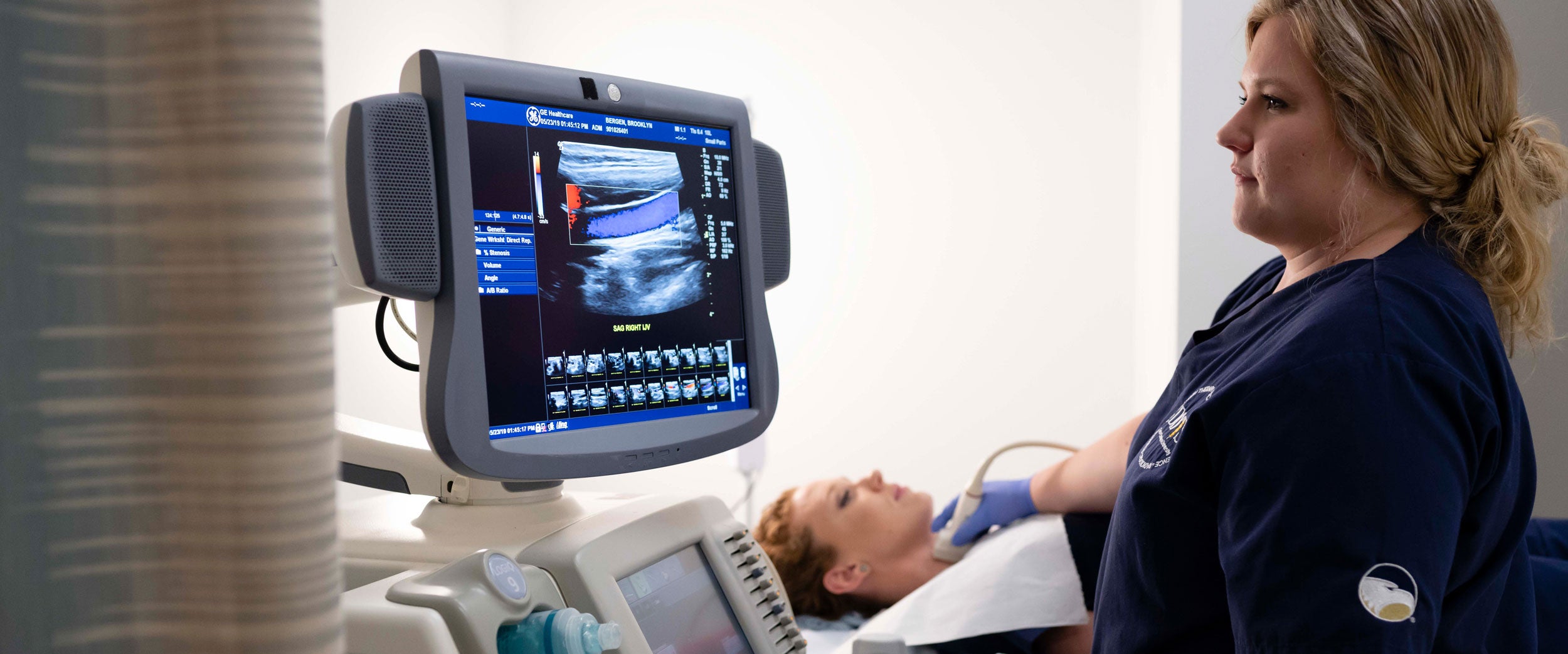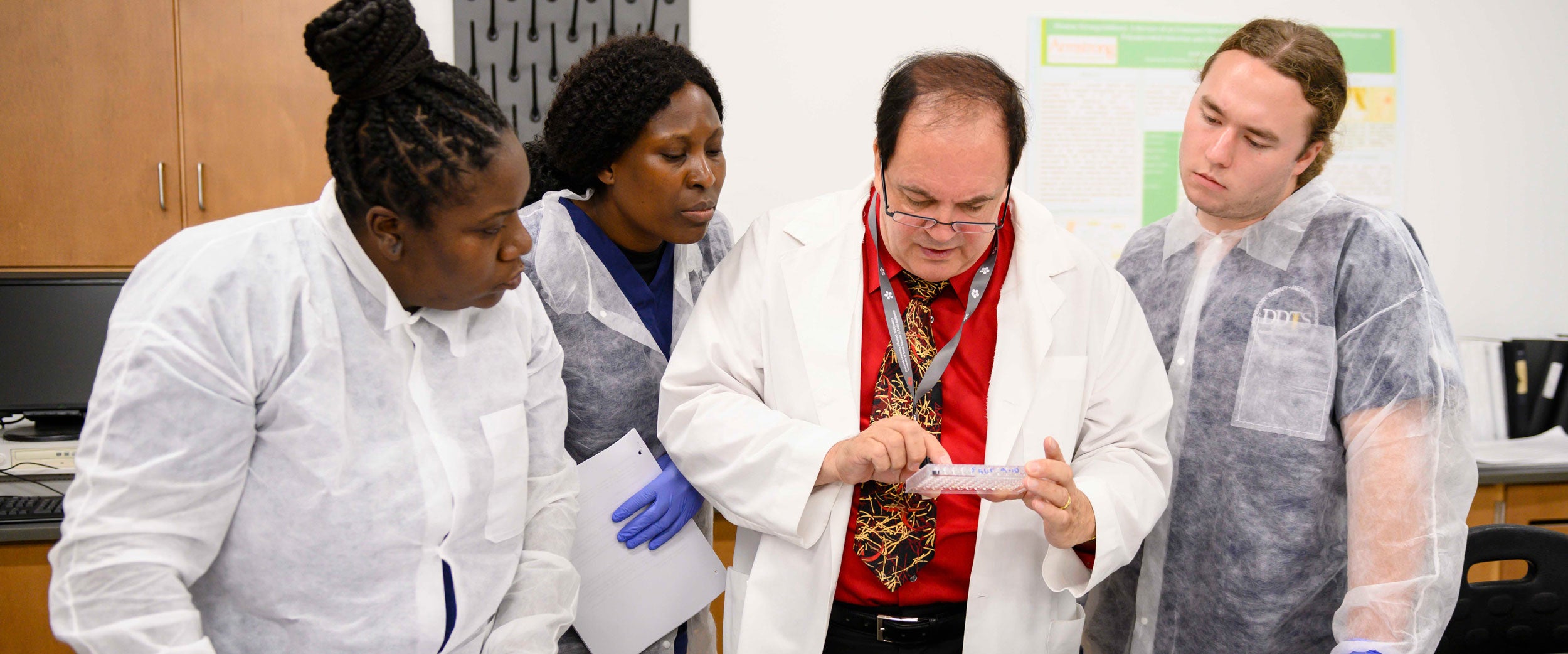Learn to use sound waves to see inside the body to prepare for a career in diagnostic medical sonography — a fast-growing profession.
Locations
- Armstrong Campus (In Person)
Why Study Diagnostic Medical Sonography at Georgia Southern?
- 100% pass rate on Abdomen-Extended, Obstetrics and Gynecology, and Sonographic Principles and Instrumentation Exams.
- CAAHEP-certified program.
- Learn to work closely with patients and physicians to deliver care.
- 130 credit hours to completion.
Sonographers see with sound, using ultrasound technology to examine organs, muscles and vascular structures, and report their findings to doctors and other medical professionals.
Studying diagnostic medical sonography gives you the skills to examine a fetus in utero, scan arteries for blockages, locate muscle tears or other injuries, and identify tumors or other masses — all without the need for invasive surgery.
Graduates of this specialized program qualify to pursue Registered Diagnostic Medical Sonographer (RDMS) certification. For multiple years, our students have had a 100% pass rate for the Sonography Principles and Instrumentation (SPI) exam and the specialty exam of their choice in Abdomen/Small Parts (ABD) and OB/GYN.
As a sonographer, you’ll work directly with each patient to help them understand the procedure and answer their questions. After the exam, you’ll share your results with other members of their care team, who will then use the images you captured to thoroughly assess the patient’s health and recommend follow-up treatments and testing, if necessary.
Ready to Apply?
What Can You Do With a Bachelor’s in Diagnostic Medical Sonography?
Medical centers in Georgia and around the country actively seek sonographers to assist with the diagnostic process. As demand for your skills rises, you might find yourself working in a physician’s office, at a hospital, in a research lab or at a dedicated clinic specializing in obstetrics or breast health. Across all settings, your duties will change from patient to patient and condition to condition.
Where our graduates work:
- Abercorn Rehabilitation Center
- Centura Health
- City of Hope National Medical Center
- Cook Children’s Health Care System
- Effingham Women’s Health
- Greenville Health Systems
- HCA Healthcare
- IDR, Inc.
- Inova Health System
- Nationwide Children’s Hospital
- Planned Parenthood
- Rehabilitation Hospital of Savannah
- Soliant Health
- Westmed Medical Group
What our graduates do:
- Sonographer
- Ultrasonographer
- Ultrasound technologist
What You’ll Learn
Classes for the diagnostic medical sonography concentration cover topics in scanning techniques, invasive procedures and sonography specialties, such as obstetrics, the abdomen along the lifespan, and more.
Every sonography student completes coursework on physics, patient care and assessment, research, technology and techniques, and other foundational areas. You’ll also complete core curriculum classes in math, the sciences and the liberal arts, including history and English.
See the CurriculumBuild Your Experience
Each of our radiologic sciences concentrations centers around practical experiences. You’ll start with guidance from caring faculty in our state-of-the-art facilities and then progress to the field in intensive clinical rotations.
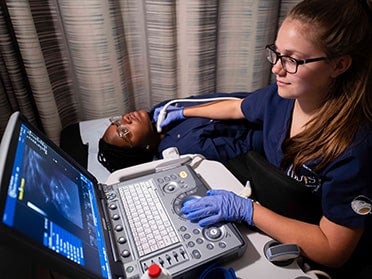
Real-World Experience
Leave the lab and head to several off-campus centers to complete your clinical fieldwork requirement. Experienced professionals closely supervise you as you learn to work with actual patients.
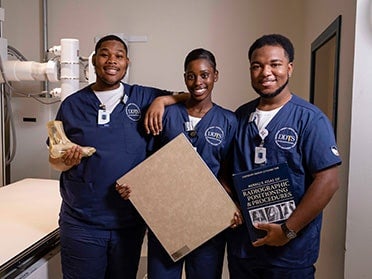
Student Organizations
Participate in student groups such as the Radiologic Sciences Student Association, Lambda Nu National Honor Society, Institute for Healthcare Improvement (IHI) and Health Sciences Student Association (HSSA). See more of our student organizations here.
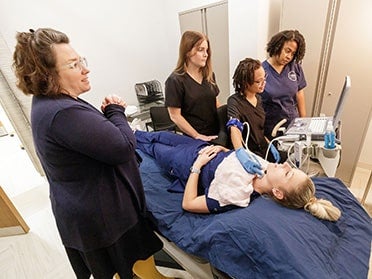
Facilities + Faculty
Refine your judgment and technique as you work with faculty scholars and practitioners during clinical experiences and while conducting research.
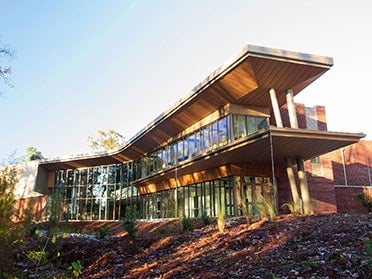
Hands-On Training
Long before your first clinical rotation, you’ll learn how to operate the same sophisticated imaging equipment professionals use in the clinical setting in our 63,000-square-foot Health Professions Academic Building, which opened in 2019.
Want to Learn More?
Explore essential information about our BSN program, including application details, accreditation status, and licensing disclosures. Gain insight into the program’s credibility and requirements to help you start your journey toward success with the knowledge you need.
Applications for the radiologic sciences program with a concentration in sonography are accepted from Nov. 15 through March 1.
Late applications will be considered on a case-by-case basis. Qualified applicants who met the March 1 deadline will be granted priority over applicants who did not meet the initial deadline. Certain programs may continue to review applications after the deadline until the program’s capacity is met.
Admission to Georgia Southern University does not guarantee admission to the concentrations in radiologic sciences. The Department of Clinical Sciences has a separate formal admissions process in addition to the admission process for the University. Applicants must submit a formal application to the program of interest and transcripts of all college and technical school coursework.
Follow these steps to complete the Georgia Southern application:
- Create an application account.
- Complete our online application using the PIN you received after creating your application account.
- Once complete, pay the $30 application fee or upload a valid fee waiver. Previous Georgia Southern applicants and dual enrollment students do not need to pay the fee.
- You can check your application status at My.GeorgiaSouthern.edu/admissions three days after completing your application. This page contains live information about your admission status, including a checklist of missing documents we need to make a decision.
Applicants to the radiologic sciences program must meet these minimum admission requirements:
- Acceptance into Georgia Southern University.
- Complete and pay the Allied Health Centralized Application Service (AHCAS) Application.
- Complete the entrance exam and submit the results by March 1. Applicants may contact the Georgia Southern University Testing Services at 912-344-2582 or visit MCC 206 for more information or to schedule the exam.
- Achieve a cumulative GPA of 2.5 or higher for all college work. Applicants with less than a 2.5 may be considered under special circumstances.
- Special Options (second certification) applicants must provide proof of ARDMS, ARRT or NMTCB certification.
- Students who are admitted to the program are strongly encouraged to complete the remaining core courses during the summer semester before the start of the program. Failure to meet all core requirements before beginning the program may delay your graduation.
- Prior to applying to the program, you must complete the following:
- 50 semester hours of core degree requirements, which include two college English composition courses and college algebra or higher.
- Required lab sciences (significant preference for admission will be given to those applicants that have completed all of the five required sciences):
- Diagnostic Medical Sonography — Must include Human Anatomy and Physiology I and II with labs, Physics with lab or Physical Environment with lab, and one additional lab science in the program of study.
Applicants not meeting the criteria stated above may apply and will be considered under special circumstances at a later date.
A new class begins in August (fall semester) each year. Applications will be considered on a competitive basis, and written notification of acceptance will begin in late March (no one will be notified of acceptance by phone). Applications received after the submission deadline will be considered only if seats are available. The amount of completed coursework, the number of science courses completed, entrance exam scores and GPA determine competitiveness. Additional points may be awarded for completion of selected coursework in the major. Interviews may be required for qualified candidates. Please see your advisor for details.
Please note that prior conviction of a felony or misdemeanor may prevent you from sitting for the national certification examination. If you have been convicted of either a felony or misdemeanor, you must complete the pre-application review process as prescribed by the certification agency and provide the Department with verification of eligibility for the examination.
It is the student’s responsibility to ensure that a current and correct address is on file with the Department of Clinical Sciences, Radiologic Sciences program. The Department assumes no responsibility for postal items once students leave the radiologic sciences program.
Georgia Southern University is an equal-opportunity education institution and does not discriminate based on sex, race, age, religion, sexual orientation, disability, or national origin in employment, admissions or activities.
Apply as a First-Year Student Transfer to Georgia SouthernThe Diagnostic Medical Sonography program is accredited by the Commission on Accreditation of Allied Health Education Programs (www.caahep.org) upon the recommendation of the JRC-DMS Commission on Accreditation of Allied Health Education Programs.
Commission on Accreditation of Allied Health Education Programs (CAAHEP)
9355-113th St. North, #7709
Seminole, FL 33775
Phone: 727-210-2350
Fax: 727-210-2354
caahep.org
2021-2023 Data (PDF)
The Department of Clinical Sciences anticipates that graduates of this program will seek the following professional state licenses or national certifications: Registered Diagnostic Medical Sonographer (RDMS).
The Department of Clinical Sciences has determined the required classes and educational activities of this academic program will qualify a graduate of this program to take the ARDMS Sonography Assessments for RDMS certification. The Department has not determined whether this program satisfies the requirements of all states and territories for the RDMS certification and state licensure. Visit the American Registry for Diagnostic Medical Sonography to determine the requirements of your state or territory.
Many of the clinical programs offered by the Waters College of Health Professions (WCHP) require a clinical internship or practicum experience to fulfill degree requirements. Pursuant to the University’s legal agreements, participants in clinical experiences are required to abide by the workplace rules of the clinical site. The University is aware of recent federal requirements that would mandate vaccination against COVID-19 for those working in certain settings, including health care. At this time, we expect that these new requirements may significantly impact our ability to locate a placement for students who remain unvaccinated. As always, WCHP will continue to make every effort to place students at clinical sites. However, please be aware that we may be unable to locate a site to accept unvaccinated students, which may cause a delay or inability to progress and complete the program of study.
Related Programs
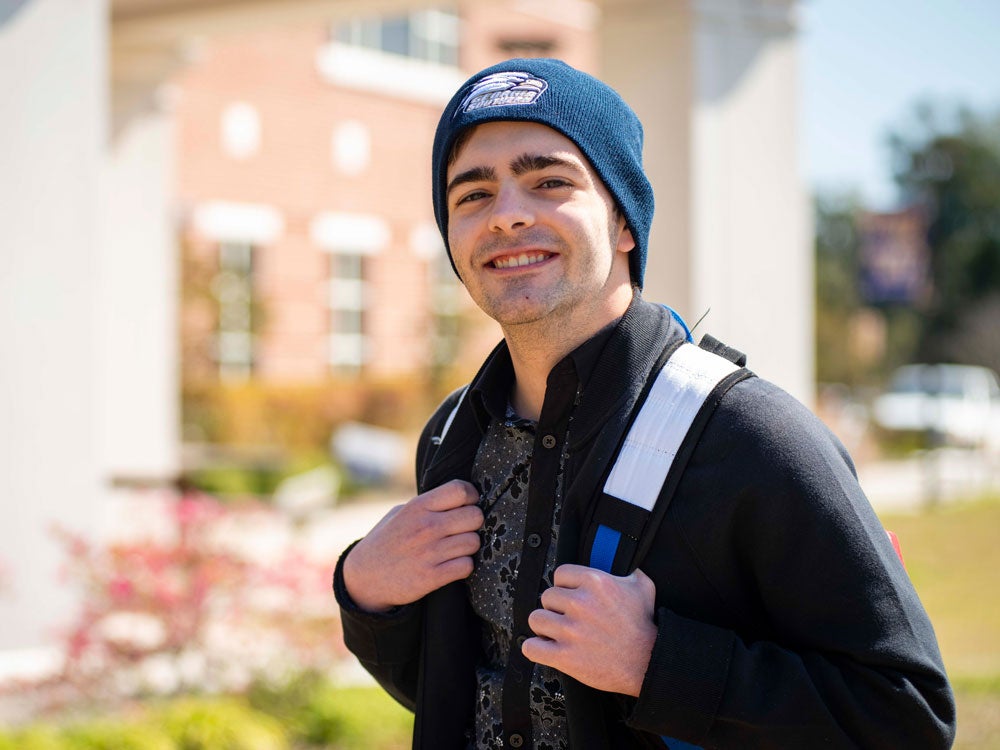
Take the Next Step
High-tech meets high-touch in Georgia Southern’s diagnostic medical sonography major. Ask us about earning your BS in Radiologic Sciences.

